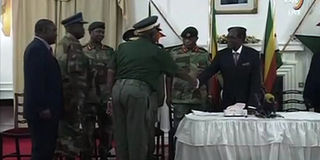How President Robert Mugabe could leave power

A video grab made on November 19, 2017 from footage of the broadcast of Zimbabwe Broadcasting corporation (ZBC) shows Zimbabwe's President Robert Mugabe (C) shaking hands with an army chief as he delivers a speech in Harare, following a meeting with army chiefs who have seized power in Zimbabwe. AFP PHOTO
What you need to know:
- The African Union and the Southern African Development Community regional bloc have warned the army not to try to remove Mugabe by illegal means.
Zimbabwe's President Robert Mugabe has defied expectations by not resigning, but the 93-year-old veteran leader could now face an impeachment process initiated by his own party.
Following the army's seizure of power last week, the ruling ZANU-PF party sacked him as its leader over the weekend and the influential veterans' association has called for further mass demonstrations.
Here are some of the possible routes by which Mugabe could leave power:
Resignation
Article 96 of Zimbabwe's constitution says that the president can resign if he submits a letter to the parliament speaker who must publicly announce it within 24 hours.
Resignation would be the fastest, simplest and least risky way for Mugabe to leave power -- but that looks unlikely.
During his first meeting on Thursday with the general who led the military takeover, he bluntly refused to step aside.
And on Sunday he showed once again that he intends to resist all calls to resign.
Another sticking point is political. The constitution says that in the event of a presidential resignation, he will be replaced by the vice president.
But the military's preferred candidate to succeed Mugabe, Emmerson Mnangagwa, was sacked by Mugabe on November 6 in a move which triggered the current crisis.
There is, however, a second vice president -- Phelekeza Mphoko, who is loyal to First Lady Grace Mugabe -- who would be automatically be named as interim leader in a development the army would want to avoid.
If Mnangagwa was to have any chance of taking over, the army would first have to persuade Mugabe to reappoint him.
Impeachment
The National Assembly and the Senate can begin proceedings to remove the president if both pass simple majority votes against him -- either on grounds of "serious misconduct", "violation" of the constitution or "failure to obey, uphold or defend" it, or "incapacity".
Once the votes are passed, the two chambers must then appoint a joint committee to investigate removing the president.
If the committee recommends impeachment, the president can then be removed if both houses back it with two-thirds majorities, according to section 97 of the constitution.
The vast majority of elected ZANU-PF representatives, like the opposition, are now in favour of removing Mugabe -- but the process could be slow.
And like the resignation route, it would also result in Mphoko becoming head of state.
Forcing him out
The military seized power late on November 14 but have been at pains to give the impression of obeying the law, seeking to play down suggestions their intervention amounted to a coup.
"We wish to make it abundantly clear that this is not a military takeover... We are only targeting criminals around (Mugabe)," said Major General Sibusiso Moyo in an address shortly after the takeover.
The African Union and the Southern African Development Community regional bloc have warned the army not to try to remove Mugabe by illegal means.
The generals appear to have heeded their warnings and have instead pushed for dialogue with Mugabe, appearing alongside him at Sunday's TV address. It is unclear how long they will tolerate his apparent stalling tactics.




